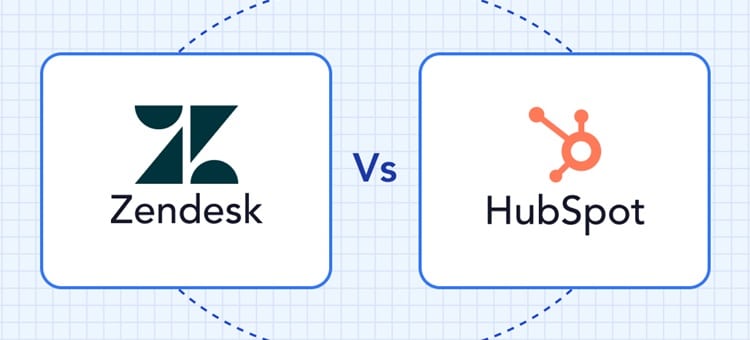Started as a way for businesses to provide seamless customer service, customer relationship management software applications have grown to become the all-in-one platforms for your business operations.
Whether offering after-hours phone service or tracking leads and collecting reports, these platforms have everything you need to grow your clientele. Zendesk and HubSpot are two names that often pop up in search lists when mentioning the world’s leading CRM solutions.
First, we have Zendesk, which is packed with an excellent range of customer management features. On the other hand, there’s HubSpot, an ideal CRM solution for businesses that want to streamline the four key elements of their operations: sales, marketing, content management, and customer service.
So, which one is better? If you have compared the two, you may have noticed both platforms boast a wide variety of CRM tools that provide flawless support service. However, each has different pricing plans and functionalities.
In this Zendesk vs. HubSpot comparison guide, we will explore each platform and help you choose the most suitable one for your business. Let’s start with a brief overview of each.
Zendesk: A Robust Customer Management Solution
One of the most versatile and scalable CRM platforms, Zendesk serves as a cost-efficient and robust customer management portal where you can handle your entire customer base effectively.
It’s a support system that makes it easier for your IT agents and employees to handle your customers’ queries in a single place. With multiple integrations, advanced sales functionalities, built-in reporting & analytics, and an exceptional ticketing module, Zendesk is a top choice for SMBs and large-scale organizations. Its tools are especially beneficial for IT help desk service providers.
Zendesk’s core functionality for businesses is its ticketing system. Tickets are routed to the most qualified agents and escalated automatically to the top-tier managers for faster resolution.
The company has integrated AI into its system to streamline business workflow. You can use it to build a self-service portal for your customers. Zendesk Sell is its most prominent feature, enabling teams to manage leads, close more deals, and drive greater revenues.
HubSpot: Get Your Sales, Marketing, and Customer Management in One Place
HubSpot started as a customer relationship software and is now a full-featured service solution that manages your sales, marketing, customers, and content in one place.
From building a customized website using its drag-and-drop editor to nurturing leads, managing tasks, and offering stellar support, HubSpot helps businesses seamlessly transition to digital business.
What sets it apart from Zendesk and other CRM solutions is its free version. While the free HubSpot plan has limited functionalities, it does offer everything a startup or a small business needs to kickstart their CRM journey with an easy-to-use customer service platform.
You can use its free plan to store customers’ contact information, implement live chat support for real-time interactions, generate useful insights through its reporting dashboard, and use its email marketing tools to develop personalized emails.
HubSpot helps businesses retain their existing clients while closing more new deals. Its wide array of features across sales marketing and customer management allows your team to record customer data in your CRM and build a personalized user experience.
Zendesk Vs. HubSpot
Zendesk and HubSpot are full-fledged CRM solutions designed to improve your customer experience and team productivity. Both feature unified dashboards, reporting tools, several integrations, and other features that automate the mundane tasks for your team.
We’ve compared the two based on factors like ease of use, pricing, integrations, and more. This comparison guide will help you select the one that’s most suitable for your business type and requirements.
Ease of Use
Zendesk:
Zendesk offers customer-centered services, which mainly consist of ticketing solutions and reporting and analytics. Unlike other CRM tools, it doesn’t overwhelm new users or non-tech specialists with multiple screens and cluttered interfaces.
All features within the ticketing module and other service sections are clearly organized in a unified dashboard, which can be shared between your internal team members.
Zendesk offers a short learning curve. Its ticketing system, specifically, is designed to make it easier for your agents to create, assign, escalate, update, and manage tickets generated from multiple sources in a centralized system.
They have also used the best training material, including video tutorials and detailed documentation, helping new employees learn its basics quickly. They have a community forum as well.
HubSpot:
As mentioned earlier, HubSpot has consolidated different areas of your business management (sales, marketing, customer management, and content management) into a single interface. While they have made the navigation part easier, its wide range of functionalities can still feel overwhelming.
One thing businesses appreciate about HubSpot’s marketing and customer service tools is their simplicity. They are designed with beginners in mind. You don’t need to be an IT professional to use email campaigns, task management, live chat, and other software tools.
Like Zendesk, HubSpot has used advanced learning resources, including several tutorials and a community forum, to familiarize its users with all its core functionalities.
Winner:
Both Zendesk and HubSpot offer an intuitive user interface. However, HubSpot is comparatively more complex than Zendesk. That’s mainly because of the different range of services that are combined into a single platform. So, Zendesk is your best choice if you want a clean, intuitive user interface with a short learning curve.
Customer Service Efficiency
Zendesk:
Zendesk is primarily a customer support service platform that focuses on offering prompt customer response and unparalleled service at all hours. Its robust and scalable ticketing system is its core functionality.
The fully integrated ticketing module can automate your workflow with features like automated ticket creation, assigning, and escalation. They support multiple support channels, including social media, live chat, phone, email, and even third-party integrated platforms, like Slack.
User queries generated from the supported communication portals are automatically converted into tickets and assigned to the qualified and available agent.
Businesses can use Zendesk to create a comprehensive knowledge base and self-service portals that allow customers to help themselves. They can find answers to their basic questions without contacting your agents.
Moreover, you can add blogs and videos to help your audience learn the basic functionalities of your products and services.
HubSpot:
Contact management is HubSpot’s standout aspect. The tool provides you with a neat dashboard where you can store your contact information, including every interaction they have had with your business.
This provides your sales reps with a clear picture of each prospect and their requirements. Based on this data, your team can more easily provide personalized customer service to each user, thus offering a seamless end-user experience.
Like Zendesk, HubSpot offers an omnichannel communication system. Your customers can contact you via phone, email, live chat, and social media, although the available support options depend on the plan you choose. For instance, in-app and live chat support is available in paid plans only.
With HubSpot, you can create a searchable knowledge base where your users can find relevant articles and help guides for the issues they are facing. The self-service portal is available 24/7, and its smart ticketing solution easily connects your customers to your agents.
Winner:
Zendesk and HubSpot offer customer service features that help your agents offer a stellar support service.
While Zendesk excels in ticketing, HubSpot’s contact management, lead generation, and other advanced customer service features make it the best choice for businesses that want to consolidate customer service features into one robust platform.
Sales and Marketing Tools
Zendesk:
Zendesk’s primary area of operation is its customer support service. As mentioned previously, its ticketing system is its best feature and the reason why it’s famous among IT professionals and customer support service providers.
The company has integrated basic sales tools, like lead tracking and contact management, but it isn’t as feature-rich as HubSpot in terms of sales features.
That said, Zendesk offers a few exceptional features that make your marketing campaigns more efficient than other CRM tools.
Its Smart List functionality, for instance, can organize your customers’ databases so that you can create personalized marketing campaigns for your audience based on their profiles and interactions with your team.
HubSpot:
HubSpot has a separate service section dedicated to its sales offerings. They have integrated the sales software applications that allow your sales reps to connect with your customers and move them through the sales funnel seamlessly.
Using these smart solutions, you can close more deals, generate qualified leads, and get better responses from your audience. A few of HubSpot’s sales tools that are useful for all sizes and natures of businesses are:
- Business Insights
- Sales pipeline management
- Call logging
- Sales tracking
- KPI software
- Task management
- Payments
- Free meeting scheduler
- Document tracking
- Quote Software
- Email Scheduling
It also has customer profile software that can store your customer’s contacts and interactions, thus helping you know who engaged with your business, their resolved tickets, and previous interactions with your agents.
Not just sales, but HubSpot delivers the best marketing solutions. You can run your email and Google paid ad campaigns right from HubSpot’s dashboard and track their performance through its reporting tools.
It also allows you to build your website and optimize your content for search engine ranking.
Winner
HubSpot is the clear winner in terms of sales and marketing solutions. Zendesk offers limited sales features, which are often only about tracking your leads and helping them navigate your sales funnel. HubSpot, on the other hand, has added a vast array of simple yet highly functional tools that make running your sales and marketing campaigns a breeze.
Data and Analytics
Zendesk:
Zendesk’s dashboard offers key performance indicators on how your sales and marketing campaigns are performing, the deals that are highly likely to be successful, and data on more complex business operations.
The customer support module also comes with a built-in dashboard that offers insights into the most crucial support metrics, such as time to resolve tickets, time it takes to answer customer calls, ticket response time, resolution rate, and customer satisfaction score.
Zendesk also offers report customization options that enable people to create their own reports and organize the data in an unambiguous format using tables, charts, and other formats.
HubSpot:
HubSpot prioritizes sales and marketing metrics, providing deeper insights into your email, SEO, and PCC campaigns. You can collect detailed information about how well your campaigns are performing, which source is generating the maximum leads and sales team productivity.
Its reports and analytics tools are also available for your customer support services. You can track metrics like ticket resolution, customer satisfaction, customer engagement, and more.
In addition, you can collect reports on inventory management and your business profit and loss statement. Whether it’s your sales team’s performance or your customer service, HubSpot’s analytics provide detailed information about all business operations.
Winner:
HubSpot is better in terms of reports and analytics, as it’s a more comprehensive solution offering insights into all major aspects of your business.
Zendesk’s reporting tools are a good choice for IT service providers and small-scale organizations that focus mainly on customer service. If you want to track your sales, marketing, and other areas of business, your best choice is HubSpot.
Integrations
Zendesk:
Featuring an app marketplace with more than 1,000 integrations, Zendesk allows businesses to add advanced functionalities to their CRM solution across various categories. These include productivity tools, sales tracking, and more.
These plug-ins are divided into 16 categories. Use the search bar to find the plug-in of your choice and integrate it into your Zendesk portal in a few clicks.
Its knowledge base is customizable, allowing you to select from 150 ready-made knowledge base templates. You can pick the one that complements your brand and has the look you want for your support service page.
You can also build custom apps using Zendesk’s API integrations. This allows you to extend its functionality beyond the Zendesk’s basic features.
HubSpot:
HubSpot offers the same range of integration options as Zendesk. Its native app marketplace features more than 1000 apps that can be easily integrated into HubSpot.
Since the platform has incorporated sales and marketing dimensions into its CRM solution, it includes tools like WordPress, Shopify, and Canva. This lets users connect their CRM platform to their eCommerce websites and design apps.
Winner:
Both HubSpot and Zendesk offer multiple integration options, but Zendesk is a good choice if you want third-party integrations in searchable plug-ins.
Although HubSpot also offers multiple app integration options, exploring its app marketplace can be a bit overwhelming, as the company has consolidated apps from different categories into a single place.
Conclusion
There’s no clear choice between Zendesk and HubSpot. Both have different functionalities but the same goal – to help increase your sales and drive higher revenues.
HubSpot is for businesses that want a CRM that offers functionalities beyond customer service management.
With its sales and marketing tools and robust analytics features, Zendesk allows you to manage most of your business operations in one place. It is for businesses that want to retain more clients by providing stellar support service.







